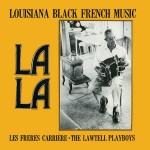Folklorist Nick Spitzer, now of American Routes radio fame, made these home recordings of Les Frères Carrière and the Lawtell Playboys in 1976 that were released commercially the following year. On the eight tracks featuring Les Frères Carrière, Eraste (accordion) and BéBé (fiddle), it’s easy to ascertain zydeco’s early roots: Afro-Caribbean with its intricate polyrhythms and Eastern European with a mazurka, and “Robe À Parasol” with very Creole lyrics. Additionally, there’s a Cajun influence with “Bosco Stomp” and “Valse à Cherokee,” though they’re rendered in more of a bluesy Creole style. Among the highlights are the pair of BéBé’s signature tunes, the pulsating “Blues À BéBé” and the hard-driving “Blue Runner,” that have been covered countless times since.
When this recording took place, Eraste and BéBé had already been retired from the Lawtell Playboys for a decade. Eraste’s son, Calvin, another exemplary Creole fiddler, carried the torch for the group’s second incarnation and enlisted accordionist Delton Broussard, who added a few family members to the fold. The five tracks featuring the Lawtell Playboys are a tad more amped up than the acoustic-centric Les Frères Carrière, but they retain the quintessential feeling of rustic la la, the forbearer to modern zydeco. The haunting version of Big Joe Williams’ “Baby Please Don’t Go” was one of the Lawtell Playboys’ staples, and two more songs are Broussard originals. J.C. Gallow’s double syncopated rubboard rhythms are in-your- face prominent, as if there were a snappy tap dancer stomping on a hardwood floor.
It was a different era then, and though this release is long overdue it couldn’t have come at a better time given zydeco’s ever-changing climate.
Buy La La Louisiana Black French Music by The Carrière Brothers & The Lawtell Playboys on iTunes





